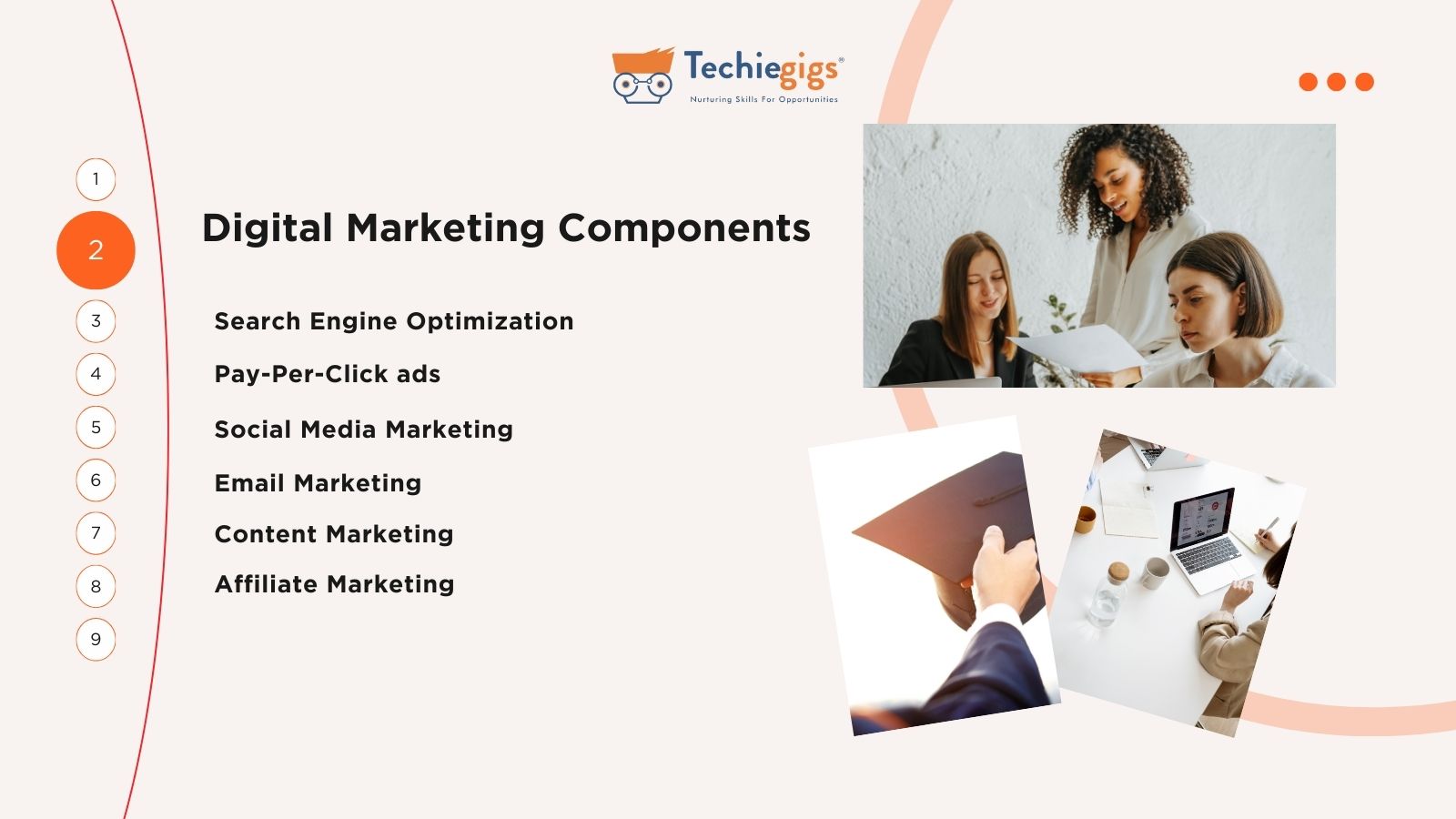There’s a rise in competition for getting the right Job. But why is everyone confused between Digital Marketing and Data Analytics? Do you think it’s the same thing or are inter connected or maybe have something in common ?

Lets Understand how among the growing businesses, there’s a rise in demand for data-driven decisions and innovative marketing strategies. There are two career paths which dominate these demands by big businesses which are Digital Marketing and Data Analytics. Both of the career paths have witnessed massive growth fueled by technological advancements and evolving consumer behavior. While Digital Marketing is focused on creating, optimizing, and promoting online content to engage users, Data Analytics revolves around extracting insights from data to drive business decisions.
This blog will provide a comprehensive comparison of both fields, covering job roles, skill requirements, salary insights, and future prospects. If you’re considering a career in either of these domains, this guide will help you make an informed decision.
Table of Content:
- Understanding Digital Marketing and Data Analytics
- How are they Connected?
- Career Opportunities and Job Market Trends
- Skills Required and Learning Path
- Work-Life Balance and Job Satisfaction
- Final Verdict: Which Career path should you choose?
Understanding Digital Marketing and Data Analytics
What is Digital Marketing?
Digital marketing is the practice of leveraging digital channels, such as search engines, social media, email, and websites, to connect with potential and existing customers. It helps businesses increase their online presence, drive engagement, and boost revenue.
Role in Business Growth:
- Builds brand awareness and credibility.
- Enhances customer engagement through targeted campaigns.
- Increases sales through data-driven marketing strategies.
- Provides measurable results and analytics to optimize marketing efforts.
Key Components:
- SEO (Search Engine Optimization): Optimizing content for better search engine rankings through keyword research, on-page SEO, technical SEO, and backlink building.
- PPC (Pay-Per-Click Advertising): Running paid ads on search engines and social media platforms to generate targeted traffic, optimizing ad spend through A/B testing and audience segmentation.
- Content Marketing: Creating valuable, informative, and engaging content in the form of blogs, videos, infographics, and podcasts to attract and retain audiences while improving brand authority.
- Social Media Marketing: Engaging with audiences through platforms like Facebook, Instagram, LinkedIn, Twitter, and TikTok by leveraging organic posts, influencer collaborations, and paid campaigns.

- Email Marketing: Building and nurturing customer relationships through personalized email campaigns, automation sequences, and newsletter strategies.
- Affiliate Marketing: Partnering with affiliates and influencers who promote products/services in exchange for a commission, driving sales through referral traffic.
- Conversion Rate Optimization (CRO): Enhancing website elements like landing pages, CTAs, and checkout processes to increase the percentage of visitors who take desired actions.
- Marketing Automation: Utilizing AI-powered tools to automate repetitive marketing tasks, segment audiences, and personalize campaigns efficiently.
Popular Tools: Google Ads, Meta Business Suite, SEMrush, Ahrefs, HubSpot, Mailchimp
What is Data Analytics?
Data analytics is the systematic process of analyzing raw data to extract useful insights and drive informed decision-making. It is widely used in various industries, including finance, healthcare, e-commerce, and marketing, to enhance performance and efficiency.
Significance in Decision-Making:
- Helps organizations identify trends and patterns.
- Improves decision-making through data-driven insights.
- Enhances customer experience by personalizing interactions.
- Assists businesses in risk management and fraud detection.
Types of Data Analytics:
- Descriptive Analytics:
- Summarizes historical data to provide insights into past trends and patterns.
- Example: Monthly sales reports, web traffic analysis, customer demographic breakdowns.
- Helps organizations understand what has happened over a specific period.
2. Diagnostic Analytics:
- Delves deeper into data to determine the causes of past outcomes.
- Example: Analyzing why an email marketing campaign underperformed by examining open and click-through rates.
- Helps businesses identify problem areas and make informed adjustments.
3. Predictive Analytics:
- Uses statistical models, machine learning algorithms, and historical data to predict future trends.
- Example: Forecasting customer churn, predicting future sales, or estimating stock price movements.
- Helps businesses anticipate customer behavior and market conditions.
Prescriptive Analytics:
- Provides actionable recommendations based on data insights to optimize decision-making.
- Example: AI-driven product recommendations on e-commerce platforms, dynamic pricing strategies.
- Helps companies make proactive decisions to enhance efficiency and profitability.
Popular Tools: Python, R, Tableau, Power BI, SQL, Google Analytics, Excel, Apache Spark.
How Are They Connected?
Digital marketing and data analytics are closely interlinked, as data plays a crucial role in shaping and optimizing marketing strategies. Every marketing campaign relies on data-driven insights to measure performance, understand customer behavior, and refine future strategies.
The Importance of Data in Digital Marketing:
- Helps in identifying target audiences and their preferences.
- Enhances marketing campaigns by analyzing real-time data.
- Aids in optimizing advertising budgets for maximum ROI.
- Improves customer engagement through personalized content and recommendations.
Role of Analytics in Tracking and Optimizing Marketing Efforts:
- A/B Testing: Marketers use analytics to test variations of ads and content to identify what works best.
- Customer Segmentation: Data analytics helps in categorizing customers based on their behavior and demographics.
- Performance Tracking: Analytics tools measure campaign performance, click-through rates, and conversion rates.
Career Opportunities and Job Market Trends
Digital Marketing Career Paths
Digital marketing offers a wide range of career opportunities for individuals with creative and analytical skills. Some of the most sought-after roles include:
- SEO Specialist: Focuses on improving website rankings and organic traffic through keyword optimization, backlink strategies, and technical SEO enhancements.
- PPC Manager: Manages paid advertising campaigns across platforms like Google Ads and Facebook Ads, optimizing ad spend and targeting for maximum ROI.
- Content Marketer: Develops high-quality, engaging content, including blogs, videos, and infographics, to drive organic traffic and customer engagement.
- Social Media Manager: Creates and manages social media campaigns, monitors engagement, and works on community building across platforms like Instagram, Twitter, and LinkedIn.
- Digital Marketing Strategist: Develops comprehensive marketing strategies, integrating SEO, PPC, content, and social media efforts to align with business goals.

- Email Marketing Specialist: Designs and executes email campaigns with personalized content, automation sequences, and performance tracking to nurture leads and retain customers.
- Affiliate Marketing Manager: Works with affiliate networks and influencers to drive traffic and conversions through partnerships and referral marketing.
- Marketing Automation Specialist: Implements AI-driven marketing automation tools to streamline campaign management and enhance customer targeting.
- E-commerce Marketing Manager: Develops online store marketing strategies, optimizing product listings, customer journeys, and conversion paths to increase sales.
- Growth Hacker: Utilizes innovative marketing tactics, A/B testing, and data-driven experimentation to rapidly scale business growth.
Job Market Trends:
- The demand for digital marketing professionals continues to rise as businesses increasingly rely on online advertising.
- Companies are allocating larger budgets for digital marketing, particularly in social media, influencer marketing, and AI-driven automation.
- Freelance and remote work opportunities in digital marketing are expanding, making it a flexible career choice.
- Performance marketing and conversion optimization skills are becoming more valuable as brands aim to maximize their return on ad spend (ROAS).
- Emerging trends include voice search optimization, AI-driven chatbots, and personalization through predictive analytics.
Data Analytics Career Paths
Data analytics presents a wealth of career opportunities across various industries, from finance to healthcare and e-commerce. Some of the top roles include:
- Data Analyst: Collects, cleans, and interprets data using statistical tools and dashboards to provide actionable business insights.
- Business Analyst: Bridges the gap between IT and business needs, leveraging data to improve operations, streamline workflows, and enhance decision-making.
- Data Scientist: Uses machine learning, predictive modeling, and deep statistical analysis to uncover patterns, forecast trends, and improve business strategies.
- Machine Learning Engineer: Develops AI-driven solutions such as recommendation engines, fraud detection systems, and automation tools.
- BI (Business Intelligence) Analyst: Designs and develops interactive dashboards and reports using tools like Tableau and Power BI to help businesses track performance metrics.

- Big Data Engineer: Works on large-scale data processing and infrastructure, utilizing technologies such as Hadoop, Apache Spark, and cloud computing.
- Data Governance Specialist: Focuses on data compliance, security, and ethical usage of data across organizations.
- Marketing Data Analyst: Specializes in analyzing customer data, marketing performance, and campaign effectiveness to refine digital marketing strategies.
- Financial Data Analyst: Works within financial institutions to analyze market trends, investment risks, and consumer financial behaviors.
- Healthcare Data Analyst: Utilizes patient and operational data to improve medical services, reduce costs, and enhance healthcare outcomes.
Job Market Trends:
- The demand for data professionals is growing as companies increasingly rely on data to make strategic decisions.
- The rise of big data, artificial intelligence, and cloud computing is creating new opportunities for skilled data analysts and scientists.
- Industries such as finance, healthcare, and e-commerce are investing heavily in data analytics to gain a competitive edge.
- Companies are prioritizing real-time analytics, requiring professionals who can handle streaming data and make instant business recommendations.
- Ethical AI and data privacy regulations (such as GDPR and CCPA) are increasing the need for data governance specialists.
Salary Comparisons
| Career Path | Average Salary (Global) | Average Salary (India) |
|---|---|---|
| Digital Marketer | $50,000 - $90,000 | INR 4-12 LPA |
| Data Analyst | $60,000 - $100,000 | INR 5-15 LPA |
| Data Scientist | $80,000 - $130,000 | INR 8-25 LPA |
Future Scope and Industry Demand
- AI and Automation in Digital Marketing: AI-driven marketing tools are enhancing ad targeting, personalization, and chatbots, reshaping the industry.
- Big Data in Decision-Making: Companies are relying on data analytics to improve efficiency and customer experiences.
- Hybrid Skill Demand: Employers prefer professionals with knowledge of both digital marketing and data analytics to create data-driven marketing campaigns.
- Industry Sectors Investing in These Skills: E-commerce, healthcare, finance, and entertainment are leading the demand for digital marketing and data analytics expertise.
Skills Required and Learning Path
Essential Skills for Digital Marketing
- SEO & SEM: Understanding search algorithms and optimizing content accordingly.
- Content Creation & Strategy: Crafting engaging and valuable content for targeted audiences.
- Social Media Management: Managing social media platforms and engagement strategies.
- Google & Facebook Ads: Running and optimizing PPC campaigns effectively.
- Data Analysis: Using Google Analytics, CRM tools, and performance tracking to improve marketing strategies.
Recommended Courses: Google Digital Garage, HubSpot Academy, Coursera Digital Marketing Specialization, Udemy Digital Marketing Masterclass, and one of the best Techiegigs Master Digital Marketing Programme.
Essential Skills for Data Analytics
- Programming: Proficiency in Python, R, or SQL for data manipulation and analysis.
- Data Visualization: Creating interactive dashboards using Tableau, Power BI, and Excel.
- Statistical Analysis: Understanding statistical methods to analyze datasets effectively.
- Machine Learning: Applying machine learning techniques for predictive analytics and business intelligence.
- Big Data Technologies: Familiarity with Hadoop, Spark, and cloud-based data solutions.
Recommended Courses: IBM Data Science Certification, Google Data Analytics Professional Certificate, Udacity Data Analyst Nanodegree, MIT Data Science and Machine Learning.
Which One is Better for You?
- Choose Digital Marketing if:
- You enjoy creativity, branding, and consumer psychology.
- You like working with social media, content creation, and advertising.
- You prefer fast-paced work with frequent campaign iterations and trends.
- Choose Data Analytics if:
- You have strong analytical thinking and problem-solving skills.
- You enjoy working with data, statistics, and programming languages.
- You prefer structured work involving research, reporting, and automation.
- Hybrid Approach: Combining skills from both fields can provide a competitive edge. Data-driven marketing strategies are increasingly in demand, making expertise in both domains highly valuable.
Work-Life Balance and Job Satisfaction
|
Aspect
|
Digital Marketing
|
Data Analytics
|
|---|---|---|
|
Workload
|
High (Campaign Deadlines)
|
Moderate to High (Data Analysis Projects)
|
|
Flexibility
|
High (Remote Opportunities)
|
Moderate (Depends on Role)
|
|
Job Satisfaction
|
High for Creative Individuals
|
High for Problem Solvers
|
|
Career Growth
|
Rapid in Startups & Agencies
|
Strong in Established Firms & Enterprises
|
|
Stress Levels
|
High during Campaign Launches
|
Moderate, but deadline-driven
|

Digital marketing roles often involve dynamic, fast-paced work environments with tight deadlines. Data analytics, on the other hand, requires patience, deep problem-solving skills, and the ability to work with large datasets.
Final Verdict – Which Career Path Should You Choose?
- Digital Marketing is ideal for those who enjoy creativity, branding, consumer engagement, and working with social media and content creation.
- Data Analytics is best suited for individuals who have an analytical mindset, strong numerical skills, and enjoy working with data-driven decision-making.
- Hybrid Skills Approach: Many companies seek professionals who can combine both skills to create data-driven marketing strategies. A marketer with data analytics knowledge can track campaign effectiveness better, while a data analyst with marketing knowledge can optimize business strategies efficiently.
Both fields offer tremendous opportunities, and choosing between them depends on individual strengths and career aspirations.
Conclusion
The world is evolving rapidly, and so are career opportunities in digital marketing and data analytics. Whether you aspire to craft compelling marketing campaigns or decipher complex data patterns, success lies in continuous effort of persistence to Learn and Adapt.
Now is the time to invest in yourself to get skilled. take the first step towards your dream career, and position yourself at the forefront of this revolution.
